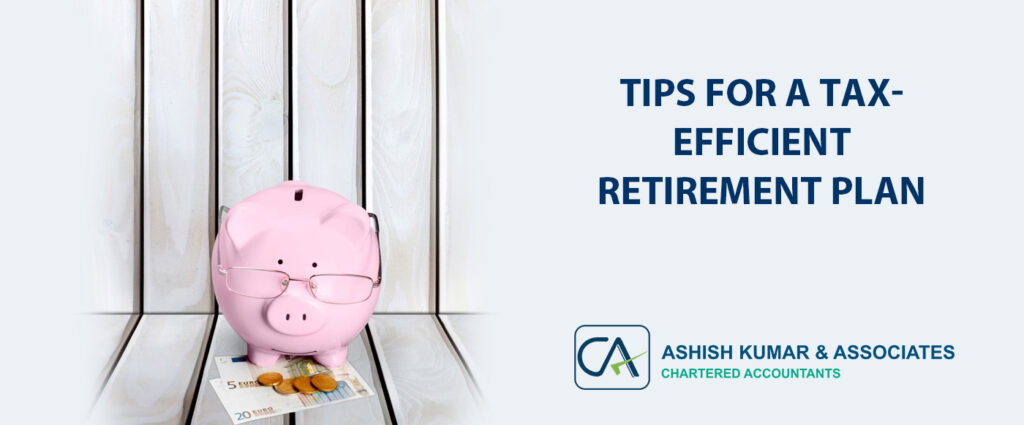Tips for a Tax-Efficient Retirement Plan

Naturally, all of us will retire one day and we definitely want our retirement to be as comfortable as possible. For this, preparing a retirement plan with the best of our ability and knowledge is needed.
But most of the times, we forget the most vital element of our retirement planning – ‘Tax.’
Tax alone has the potential to destroy your retirement plan and create obstructions in the way of achieving your dream of having a financially independent life after retirement.
So, how can you ensure that tax does not destroy our retirement kitty?
In this post, we will discuss some practical and easy tips to make your retirement plan highly tax-efficient.
From the point of view of taxation, retirement can be either before 65 or after 65. Individuals below 65 are taxed like normal individuals. They have the basic exemption limit of one lakh ten thousand and saving of one lakh plus investment in medical-claim of up to 10000. The total is 220,000.00. Though it is unfair that people retire from work at the age of 60, but not from paying taxes till 65, but there are certain tips that you can follow to heal this situation.
Here are some of the best tips
- Commute a Lot – As per U/s 10(13), any person can commute up to 33.33% in the situation of gratuity receivable or 50% in case of no gratuity of a Superannuation fund, which is free from tax. Also, the pension plans of insurance companies let people commute up to 25-30%.
The commuted amount reduces monthly pension as well as taxable income. This commuted pension can be used for pre-retirement preparation such as home furnishing. Alternatively, you can invest in tax-free options.
- Reap Dividends from Mutual Funds – The dividend earned from mutual funds is tax-free. You must invest 10-15% of your retirement portfolio in a mutual fund. This is a great way to beat inflation. At the same time, it will help you earn more monthly income. But the risk involved is that there is no amount and duration of the dividend. Still, it is an effective way to earn higher tax-free income.
- Get Benefits in Installment – Plan your retirement in a way so that you receive retirement benefits such as leave encashment, gratuity, and more in annual installments. This way, you can save paying taxes on a higher rate. Also, it gives you time to implant your money in a proper place.
- Recycle Your Tax Savings – As we have already told above, a total income of 110,000 is the basic exemption limit. If this income exceeds the limit then you have to pay tax on that or invest an amount in tax saving instruments. This condition is viable if your expenses are less than 110,000. But if it is more than the basic exemption limit, then you need to pay taxes on the expenses.
In this case, you must consider recycling your savings and using this benefit again and again.
An Effective Tax-Saving Strategy for Senior Citizens above 65
Once you are more than 65 then an individual gets the status of senior citizen. At this age, a basic exemption limit of 1.95,000 is applicable and tax saving investment of 100,000 plus 15,000 for medical-claim. This implies that you do not have to worry if your earning is up to 3,10,0000. But if it is more then you have to pay tax @20%. Hence, your focus must be on tax-free income along with other steps to save tax.
- Avoid Investments with Long Lock-In Period – Avoid investing in tax saving that has a long-term lock-in period, like NSC, PF, or more. Because of long lock-in periods, such investments become unsuitable for recycling. They are even not fit for portfolio liquidity, which is of utmost importance for a retirement portfolio.
- Cover the Taxable Income – Invest in taxable RBI bonds, monthly income scheme, bank FD and other taxable income till their proceed does not cross the above-mentioned limit. Further, the income must be invested in tax-free schemes. Investing in medical-claim is a good option as this will take care of increasing health and medical expenses.
Most of the retirement plans are based on investment, but they fail to protect the funds from taxes, which is an extremely important aspect to consider. So, follow these tips for tax-efficient retirement planning, and if still, you have queries then contact us.